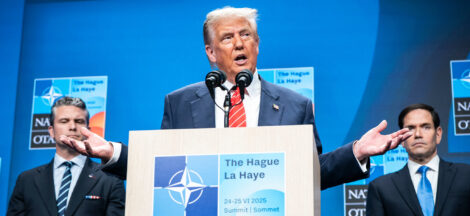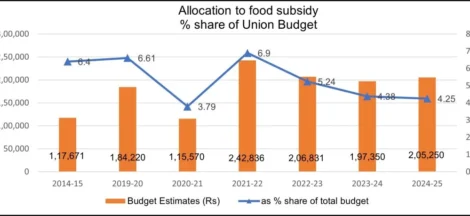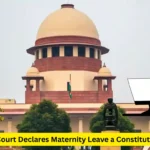By Nick French
NEW YORK: Political lightning struck New York City last night. Against all expectations, thirty-three-year-old democratic socialist and third-term state assemblyman Zohran Mamdani took a commanding lead in the first round of ranked-choice votes against former New York governor Andrew Cuomo, the primary’s front-runner. By the end of the night, Cuomo conceded defeat to his young rival.
The race has the potential to reshape national politics, upsetting the balance of forces within the Democratic Party and pointing the way to a new era of possibilities for the Left.
Even before the results started rolling in yesterday, it was clear the race had taken on major political significance, both locally and nationally. Mamdani had overcome a huge deficit in name recognition and outside campaign spending to narrow the gap with Cuomo, with some polls in recent weeks showing the two more or less in a dead heat. Almost none of the polls, however, predicted Mamdani besting the former governor in the first round, and by a large margin.
How did Mamdani pull off “the biggest upset in modern New York City history,” as a Democratic Party strategist put it? He ran an exceptional campaign, one that the Left and their opponents will be studying for years to come. Unfailingly focused on the city’s cost-of-living crisis, Mamdani proposed a handful of bold reforms that involved redistributing wealth and expanding the public sector, including fare-free buses, city-owned grocery stores, free childcare, and a massive, publicly driven expansion of affordable housing stock — issues that spoke to the most urgently felt needs of New York’s working class. The campaign ran a savvy and infectious social media operation that communicated in an upbeat and accessible way about material issues and Mamdani’s proposed solutions.
Mamdani also made important inroads with the city’s labor unions, a constituency that makes for a natural ally for the democratic socialist but that has historically tended to be more conservative in its political endorsements. And the campaign boasted a massive field operation, powered in no small part by the New York City chapter of the Democratic Socialists of America, that sent tens of thousands of volunteers to canvass for Mamdani across the five boroughs.
Attempts by opponents and the massive super PACs supporting them to paint Mamdani as a dangerous radical who hates Israel and wants to defund the police fell flat. The socialist candidate proved both principled and politically adroit. Rather than getting bogged down in sectarian disputes or unnecessarily associating himself with maximalist far-left rhetoric likely to confuse or unsettle voters, Mamdani spoke about Israel-Palestine and public safety in terms that were both commonsense and universalistic. Instead of falling into the trap laid by talking heads who asked him whether Israel had “a right to exist,” Mamdani asserted, simply, that it had a right to exist “as a state with equal rights” for all its citizens. And on policing and public safety, Mamdani rejected the language of “defund” and “abolition,” arguing that police had a “crucial role to play” in public safety but that police are currently expected to do the work of social workers and mental health professionals, work that they are not trained or well-suited to do.
For all the strengths of his campaign and his platform, Mamdani is also personally a charming presence and effective communicator, the likes of which the American left has rarely seen. He also had the fortune of running against a weak opponent in the disgraced Cuomo, who attempted to revive his political life after a slew of sexual harassment allegations forced his resignation. (Those allegations, of course, were just the tip of the iceberg of a corrupt, scandal-ridden career.)
Cuomo ran a campaign marked by very few public appearances, which relied on boatloads of outside spending to fund a deluge of attack ads against Mamdani in the race’s final stretches. And Mamdani was able to form tactical alliances with principled progressives like Brad Lander, the third-place candidate in the race, to advance their shared aim of stopping Cuomo.
Though Cuomo conceded defeat last night, the race is far from over. The later-round votes in the ranked-choice system still have to be counted. And Cuomo has set himself up to run as an independent in the general election. Whether he does or not, in the general, Mamdani will have to face off against the current mayor, Eric Adams, who skipped the Democratic primary to run on his independent (and absurdly named) “End Antisemitism” ballot line. Mamdani will almost certainly confront a flood of cash from the pro-Israel lobby, real estate interests, and other wealthy opponents on a scale that exceeds the massive amounts they spent in the primary.
Mamdani has made what could have been a depressing mayoral contest of mostly local interest into a national and international political phenomenon. By running a campaign centered on ambitious egalitarian proposals to make the city affordable for working-class New Yorkers, he is forcing establishment politicians and their supporters in the media to engage the Left on questions of class and the distribution of material resources. By defending universalism and Palestinian human rights when it comes to Israeli crimes, he is exposing the moral bankruptcy at the core of US foreign policy. By drawing big money and national political figures — including even former president Bill Clinton, who endorsed Cuomo in the final days — into the race, he is revealing the deep divides within a Democratic Party torn between fealty to corporate interests and a genocidal warmongering, on the one hand, and righteous democratic socialists like Mamdani on the other.
In this way, Mamdani’s mayoral campaign has captured some of what made his acknowledged political inspiration Bernie Sanders’s presidential campaigns so exciting. The campaign is forcing people to pick a side: for or against corruption, for or against big money in politics, for or against human rights, for or against a program that actually serves the material needs of workers.
Mamdani and those who side with him will face considerable resistance in advancing their pro-worker vision in the general election. But the coalition that has already cohered around Mamdani and delivered an astounding blow to the political establishment is a promising sign that a better world is, in fact, possible. (IPA Service)
Courtesy: Jacobin



 Supreme Court Ruling On Maternity Benefit As Fundamental Right Is A Big Step
Supreme Court Ruling On Maternity Benefit As Fundamental Right Is A Big Step 